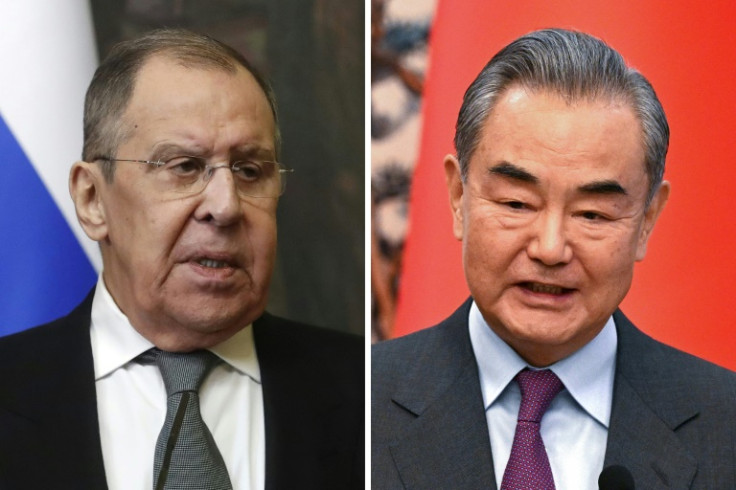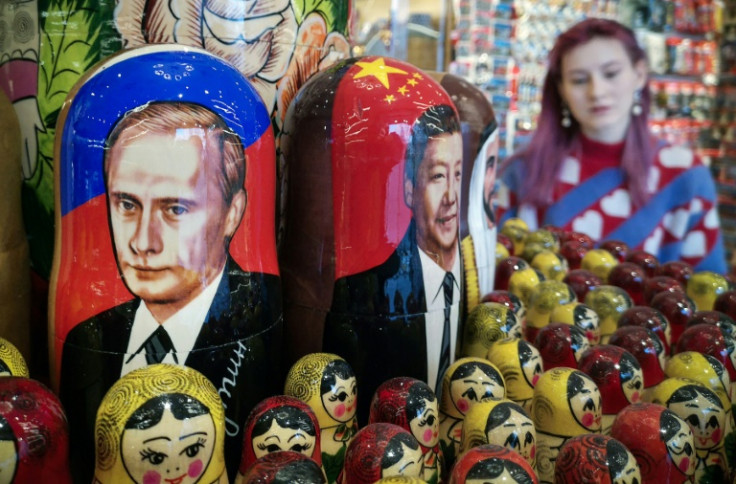China To 'Strengthen Strategic Cooperation' With Russia As Lavrov Visits

China's top diplomat said Tuesday that Beijing would strengthen strategic cooperation with Moscow and that the two must stand on the side of "fairness and justice" as he met his Russian counterpart Sergei Lavrov.
Lavrov arrived in China for a two-day official visit on Monday, with the two countries looking to deepen diplomatic ties as Russia's war in Ukraine grinds on.
Russia and China have in recent years ramped up contacts, and their strategic partnership has only grown closer since the invasion of Ukraine.
Lavrov held discussions with President Xi Jinping on Tuesday afternoon, Chinese state media announced, in a previously undisclosed meeting.
State broadcaster CCTV showed footage of chairs arranged around a glossy table in an opulent room in Beijing's Great Hall of the People ahead of the talks.
In earlier meetings on Tuesday, Chinese Foreign Minister Wang Yi promised: "China will support Russia's stable development under the leadership of (Vladimir) Putin."
"Beijing and Moscow will continue to strengthen strategic cooperation on the world stage and provide each other with strong support," Wang said, according to Russia's RIA Novosti news agency.
"Under the strong leadership of President Putin, the Russian people will have a bright future," he said.
Lavrov, in turn, thanked China for its "support" after President Putin's recent re-election, in which he was unchallenged by any meaningful opposition.
"Xi Jinping... was among the first ones to send congratulations to the president-elect Putin, and we are overall grateful to our Chinese friends for this support," Lavrov said, according to a video of the meeting shared by Izvestia on Telegram.
"The election results confirmed the deep trust of the Russian people in our leader and the ongoing domestic and foreign policies," he added, according to RIA Novosti.
"This applies not least to the course to strengthen strategic interaction and partnership with the PRC," the top diplomat said, referring to China by its official acronym.
Lavrov last visited Beijing in October for an international forum on Chinese President Xi's flagship Belt and Road infrastructure initiative.
Analysts say China holds the upper hand in the relationship with Russia, with its sway growing as Moscow's international isolation deepens following its invasion of Ukraine.
That asymmetry is still "changing in China's favour" as it enables Moscow "to continue the war by providing very necessary materials for the Russian war machine", Alexander Gabuev, director of the Carnegie Russia Eurasia Center, told AFP.
"Integrating Russia's economy, brainpower, and military technology into... a Chinese-led order with Eurasia at its geographic heart, is the only way Russia can sustain its confrontation with the West," he wrote in Foreign Policy magazine this week.
"China has stronger bargaining power and many more options than does Russia, and its leverage over its northern neighbour is growing all the time," he added.
"Russia is now locking itself into vassalage to China."
US officials have recently warned Beijing against providing indirect aid to the Russian war effort and regularly urge China to wield its influence to help bring about peace in Ukraine.
In Brussels last week, US Secretary of State Antony Blinken told reporters that "China continues to provide materials to support Russia's defence industrial base".
And Treasury Secretary Janet Yellen, who wrapped up a visit to China on Monday, said she had warned officials of the consequences of supporting Russia's military procurement.
But Lavrov on Tuesday drew a parallel between the West's "unlawful sanctions" and efforts to curb China's access to sensitive US-made technologies.
At a press conference following bilateral talks, he accused the West of seeking to impede China's "economic, technological development opportunities, to put it simply in order to eliminate the competitors".
Wang, in turn, declared that Russia and China "always stick to the correct path on great matters of principle".
"China and Russia must take a clear-cut stand on the side of historical progress, on the side of fairness and justice," he said.
"(We must) oppose all acts of hegemony, tyranny and bullying; oppose Cold War thinking and separatist provocations; and actively push for the construction of a common future for all humankind," he said.
"As a force for peace and stability, China will stick to playing a constructive role on the international stage... and will never add oil to the flames," he added.

© Copyright AFP 2024. All rights reserved.






